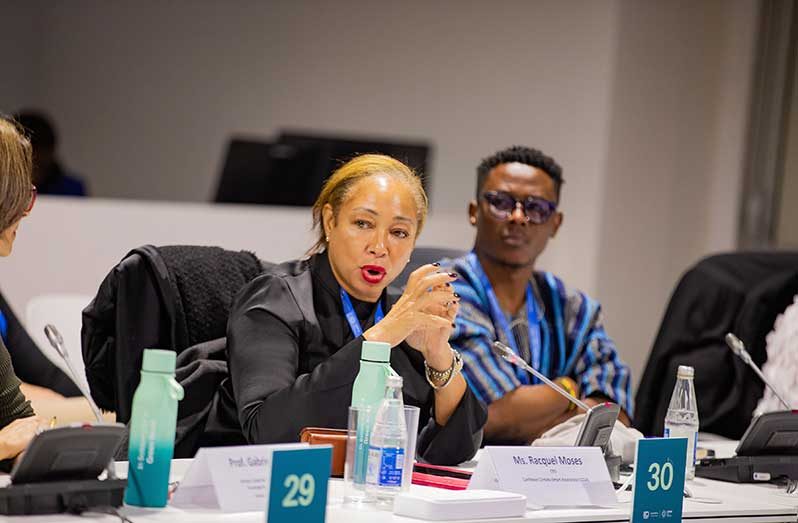high-emitting nations must step up finance commitments, says Moses
WITH the Caribbean at the forefront of climate change impacts, the region’s leading advocate, Racquel Moses, United Nations Framework Convention on Climate Change (UNFCCC) Global Ambassador and CEO of the Caribbean Climate-Smart Accelerator (CCSA), is urging stakeholders at COP29 to prioritise vulnerable regions like the Caribbean.
Rising sea levels, intensified storms, and coastal erosion threaten lives and livelihoods, underscoring the urgent need for decisive climate finance action.
In an interview with the Guyana Chronicle, Moses highlights a glaring gap in funding: while the Caribbean requires over $100 billion annually for climate adaptation, current resource flows fall far short. This demand represents just a fraction of the global $400 billion needed, yet the delays in mobilising funds exacerbate the region’s vulnerabilities.
At COP29, CCSA is advocating for innovative financing mechanisms like blended finance and climate resilience bonds to bridge this gap. These tools aim to de-risk investments and attract private sector funding, making climate adaptation projects more feasible.
Post-COP29, swift action is essential to translate commitments into tangible outcomes. Racquel Moses emphasises the need for accelerated fund disbursement to cut through bureaucratic delays and quickly reach frontline communities.
She noted the expanding innovative financing tools such as green bonds and blended finance are critical to attracting private sector investments, while tailored funding must address gaps for early-stage, “shovel-worthy” projects through targeted support for feasibility studies and design.
Public-private partnerships (PPPs), she added are key to scaling large-scale resilience projects, complemented by capacity building to empower local governments and communities with necessary training and technical resources.
Further, Ms. Moses noted that enhanced coordination, facilitated by tools like the Caribbean Climate Smart Map, will ensure funding is efficiently allocated. Embedding climate resilience into national policies will unlock additional investments, and fostering regional solidarity will amplify the Caribbean’s advocacy for international support, keeping the region’s voice central in global negotiations.
Moses is unequivocal about the need for stronger commitments from high-emitting nations, particularly for adaptation and loss and damage funding. “The pledges so far are insufficient,” she asserts, emphasising that immediate increases in climate finance are crucial for supporting regions like the Caribbean, which already face the harshest climate impacts.
While mitigation is vital for long-term climate goals, adaptation demands immediate action. Moses anticipates COP29 will spotlight adaptation funding, with a focus on projects like coastal defences and sustainable agriculture that address urgent needs in vulnerable regions.
CCSA identifies several barriers hindering the flow of climate finance, including inefficient disbursement mechanisms, limited project implementation capacity, and private sector risk aversion. Moses advocates for streamlined, transparent financing models that reduce complexity and prioritise vulnerable regions.
Moses underscores the importance of private sector involvement, advocating for blended finance models that combine public and private investments to de-risk projects. She expects COP29 to push for greater public-private partnerships, unlocking capital for infrastructure, clean energy, and resilience initiatives.
To ensure the most impacted communities and ecosystems benefit, climate finance must be accessible, flexible, and directly targeted. Moses stresses the importance of partnerships across public, private, and civil society sectors to create holistic solutions.
As COP29 unfolds, the Caribbean Climate-Smart Accelerator calls for a paradigm shift in climate finance, demanding innovation, accountability, and urgency. With the region’s resilience at stake, Moses and the CCSA are determined to turn dialogue into action, ensuring that no vulnerable community is left behind.
About Racquel Moses
Racquel Moses is a visionary leader renowned for driving transformative growth and spearheading impactful initiatives across industries worldwide. As the CEO and Director of the Caribbean Climate-Smart Accelerator, she champions climate-smart solutions and sustainable development throughout the Caribbean, positioning the organisation as a leader in climate action.
In addition to her region
al efforts, Racquel serves as a UNFCCC Global Ambassador, a Global Web3 Board member for Salesforce.com, and a Trustee for the Trinidad and Tobago Olympic Committee, advocating for global climate resilience and sustainability. Her career highlights include leading roles as Head of Microsoft Trinidad and Tobago, President of InvesTT, and Regional Vice President for Fujitsu, where her strategic vision consistently delivered innovation and success.
A dedicated advocate for collaboration, Racquel has been instrumental in fostering regional consensus on critical issues like climate change and resilience-building, making her a driving force in shaping both regional and global agendas.


.jpg)











